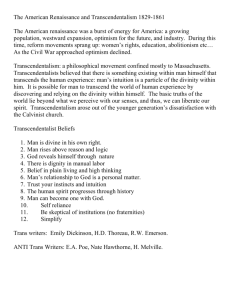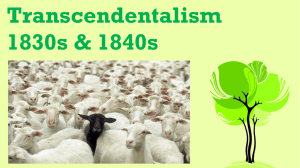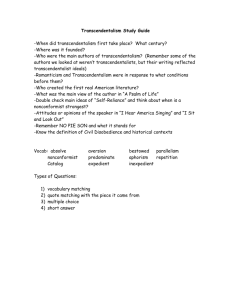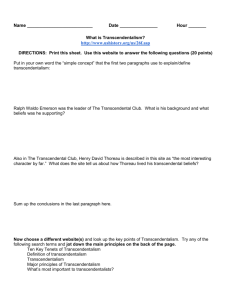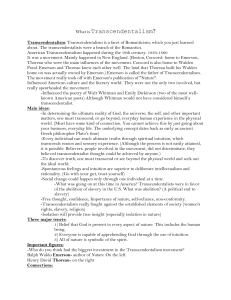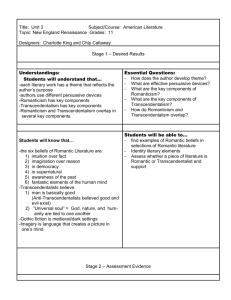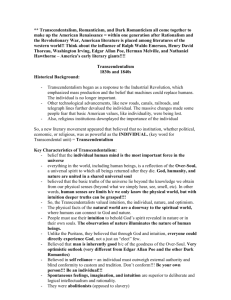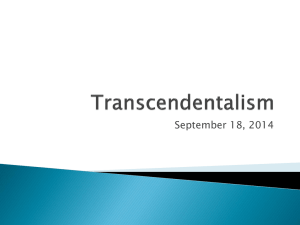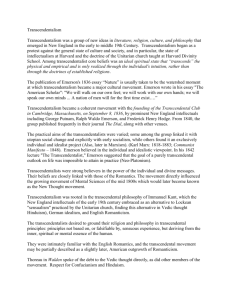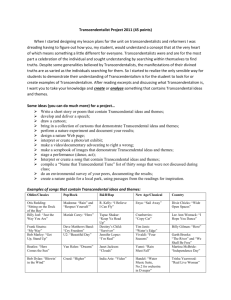Notes and Assignment
advertisement
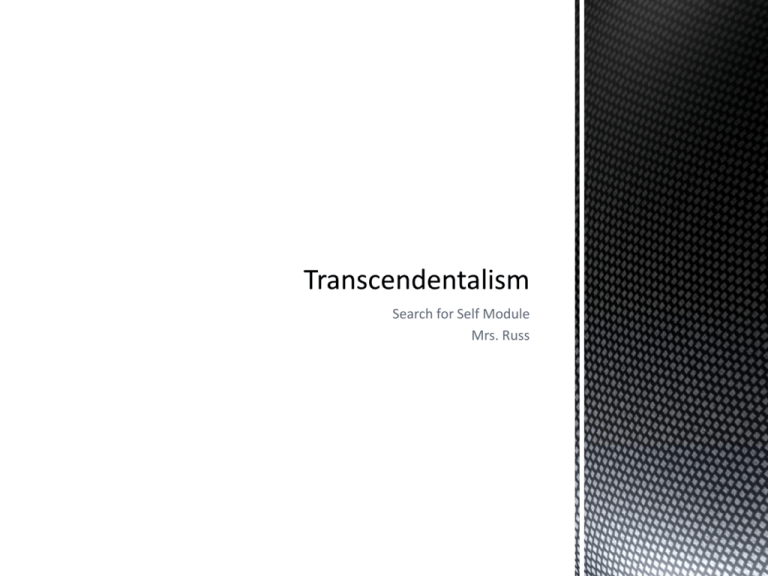
Search for Self Module Mrs. Russ *Transcendentalism was a movement within American Romanticism. Transcendentalism is known as the philosophical movement as a protest to the general state of culture and society. *Romanticism: a nineteenth century way of looking at the world which was a strong reaction against the Age of Reason (Thomas Jefferson, et. al) EMPHASIZED IMAGINATION INTUITION SPONTANEITY NATURE HIGHER TRUTHS INDIVIDUAL YES! OVER REASON LOGIC PLANNING CIVILIZATION REALITY/SCIENCE SOCIETY NO! American Romanticism – - distrust of civilization - nostalgia for the past - concern with individual freedom - interest in the supernatural - love for the beauty of the natural landscape Romantic Hero in American Fiction – -youth (or youthful innocence) -love of nature (distrust of town life) -uneasiness with women (seen as civilizing and confining influences) -need to engage in quest for higher truths -virtue lies in innocence, not in sophistication *The Transcendentalists were a group of New England writers in the mid-19th century (1830s and 40s); many were early abolitionists and feminists. *They held the view that the basic truths of the universe transcend (lie beyond) empirical knowledge (empirical: knowledge we obtain through our senses) Core tenets of Transcendentalism: *The individual is paramount. *Major inspirations included nature and intuition. *The spiritual is valued over the rational. *God is present in every aspect of nature, including every human being. *Everyone is capable of apprehending God through the use of intuition. *Transcendentalism ran counter to the prevailing emphasis on community and organized institutions. *In many ways Transcendentalism is a very American form of thought and has influenced American thought to this day. Principal Transcendentalists: Ralph Waldo Emerson: -Chief founder of Transcendentalism -Former Unitarian minister -Lecturer, essayist, and poet -Known for “Self-Reliance,” “The American Scholar,” and “The Divinity School Address” Henry David Thoreau: -Emerson’s protégé -Took Emerson’s theories and put them into practice -As an experiment, lived for two years at Walden Pond outside of Boston - Two major works: Walden and Civil Disobedience (in protest of the U.S. Mexican War and the idea of manifest destiny; inspired Ghandi and Martin Luther King, Jr.) Less well-known Transcendentalists: Bronson Louisa May Alcott (Little Women) Margaret Fuller “Sort of” a Transcendentalist: Walt Whitman - Purely American poet - Inspired by and used Transcendental ideas in his poetry - Also often grouped with the Civil War writers because of his poems about Abraham Lincoln Things to consider: 1. Would Emerson and Thoreau find Chris McCandless to be a worthy transcendentalist? Why or why not? 2. Do you think his actions were noble? Foolish? 3. Is there anything to be admired or reprehended in Chris McCandless? Are There Any Transcendentalists Today? "Have you ever felt like everybody’s watching waiting for you to lose have you ever felt like you’re living in a spot light searching for the real you" and "Don't kick the chair, it can only get better." In the part of the song performed by Kid Cudi, he says "You don't need no help, you can be better all by yourself." This correlates with the transcendental idea that you can do anything you put your mind to, and don't need to be dependent on other people. All in all, this song is a great example of transcendental views in the way that it promotes believing in yourself and not letting the pressure of society get to you or change you. Your homework tonight is to find a song that supports the ideas of Transcendentalism. Choose a line from the song that supports one of the tenets and then type a 3.8 paragraph explaining the connection to Transcendentalism. Your three points are: 1.Title of song and artist who sings it (remember that titles go in “ ”) 2.Line from the song in “ ” (word for word) with explanation of what that line means 3.What tenet of Transcendentalism this line supports and explanation http://www.readwritethink.org/files/resour ces/lesson-docs/TranscendentalSongs.pdf
